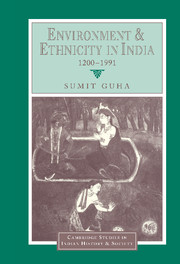Book contents
- Frontmatter
- Contents
- List of maps
- List of tables
- Acknowledgements
- Glossary
- List of abbreviations
- Introduction
- 1 From the archaeology of mind to the archaeology of matter
- 2 Subsistence and predation at the margins of cultivation
- 3 State formation in the highland forests 1350–1800
- 4 The peoples of the Sahyadri under Marathas and British
- 5 The central Indian forest from Mughal suzerainty to British control
- 6 The central Indian forest under early British rule
- 7 Identities and aspiration – not noble savage but savage noble
- 8 The high colonial period and after – new patterns of authority and power
- 9 From sanctuaries to safeguards: policies and politics in twentieth-century India
- Conclusion
- Afterword
- Bibliography
- Index
8 - The high colonial period and after – new patterns of authority and power
Published online by Cambridge University Press: 12 November 2009
- Frontmatter
- Contents
- List of maps
- List of tables
- Acknowledgements
- Glossary
- List of abbreviations
- Introduction
- 1 From the archaeology of mind to the archaeology of matter
- 2 Subsistence and predation at the margins of cultivation
- 3 State formation in the highland forests 1350–1800
- 4 The peoples of the Sahyadri under Marathas and British
- 5 The central Indian forest from Mughal suzerainty to British control
- 6 The central Indian forest under early British rule
- 7 Identities and aspiration – not noble savage but savage noble
- 8 The high colonial period and after – new patterns of authority and power
- 9 From sanctuaries to safeguards: policies and politics in twentieth-century India
- Conclusion
- Afterword
- Bibliography
- Index
Summary
Introduction
This chapter looks primarily at the policies of social and environmental engineering undertaken by the colonial regime from the middle decades of the nineteenth century, their interaction with the outlooks and ambitions of the forest peoples, and their more immediate social consequences.
Conservation and conservatism – from imperial to independent India
John Malcolm (fl. 1798–1830), an important shaper of policy in western India, favoured the maintenance of what he saw as appropriate hierarchies in Indian society. In a minute written while Governor of Bombay, he emphasised the need to sustain hierarchies in Bhil society as much as in other parts of India, even while the policies of his administration inevitably undermined them. Following the suppression of the great uprising of 1857–58, the colonial government was more aware of the extent of its power but had developed an acute sense of the danger of upsetting established hierarchies, as represented by the princely states, landlords and the proprietor (malik) stratum of peasants, in Indian society. On the other hand, the successful extirpation of the risings in the Central Indian jungles seemed evidence that the forest peoples were no longer a formidable menace. If therefore, the first viceroys began with a determination to uphold the perceived status quo in the agrarian order, they also embarked more confidently on reconstructing a supposed ecological status quo in the wild lands that abutted the sown.
- Type
- Chapter
- Information
- Environment and Ethnicity in India, 1200–1991 , pp. 164 - 181Publisher: Cambridge University PressPrint publication year: 1999



